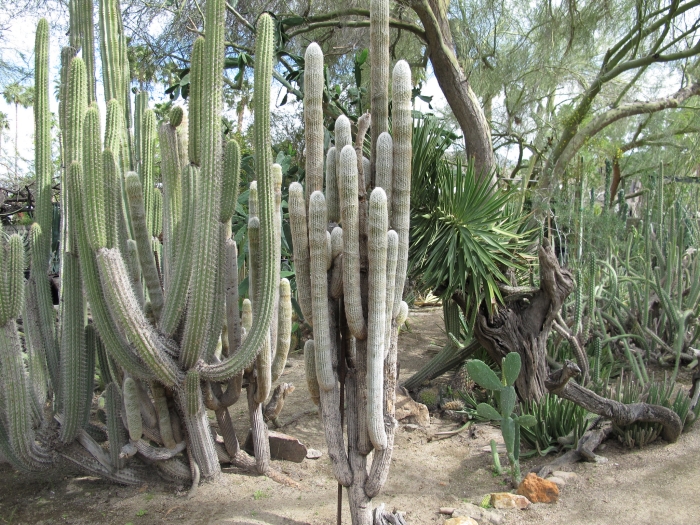Peruvian Old-Man Cactus
(Espostoa lanata)
Peruvian Old-Man Cactus (Espostoa lanata)
/
/

Megan Hansen
CC BY-SA 2.0
Image By:
Megan Hansen
Recorded By:
Copyright:
CC BY-SA 2.0
Copyright Notice:
Photo by: Megan Hansen | License Type: CC BY-SA 2.0 | License URL: https://creativecommons.org/licenses/by-sa/2.0/ | Uploader: MeganEHansen | Publisher: Flickr |



































Estimated Native Range
Summary
Espostoa lanata, commonly known as Peruvian Old-Man Cactus, is an evergreen succulent native to the arid highlands and mountainous regions of Ecuador and Peru. It is a columnar cactus that can reach up to 7 meters tall in the wild and about 3 meters when cultivated, with a diameter ranging from 5 to 20 cm. The plant has 18 to 25 ribs, which are mainly hidden by dense, woolly tissue, giving it a distinctive hairy appearance. It is a slow-growing species that branches only after several years. Espostoa lanata is notable for its nocturnal purple flowers, which bloom from a lateral cephalium after the plant has matured for several years. The flowers are not particularly showy due to their nocturnal nature but are interesting for their rarity and timing.
This cactus is valued for its unique, woolly appearance and is often used as an ornamental plant in xeriscapes, rock gardens, and as a potted specimen in colder climates. It is easy to grow, requiring fertile, well-drained soil. During the summer, it should be watered thoroughly but allowed to dry before the next watering. A monthly application of cactus fertilizer is beneficial. In winter, it should be kept dry, and while it can survive temperatures as low as −12 °C, it is best to protect it from frost. It thrives in full sun during the summer and should be kept in a bright location during winter. Under optimal conditions, it can grow up to 20 cm per year.CC BY-SA 4.0
This cactus is valued for its unique, woolly appearance and is often used as an ornamental plant in xeriscapes, rock gardens, and as a potted specimen in colder climates. It is easy to grow, requiring fertile, well-drained soil. During the summer, it should be watered thoroughly but allowed to dry before the next watering. A monthly application of cactus fertilizer is beneficial. In winter, it should be kept dry, and while it can survive temperatures as low as −12 °C, it is best to protect it from frost. It thrives in full sun during the summer and should be kept in a bright location during winter. Under optimal conditions, it can grow up to 20 cm per year.CC BY-SA 4.0
Plant Description
- Plant Type: Succulent
- Height: 12-21 feet
- Width: 0.7-4.5 feet
- Growth Rate: Slow
- Flower Color: White
- Flowering Season: Spring, Summer
- Leaf Retention: Evergreen
Growth Requirements
- Sun: Full Sun
- Water: Very Low
- Drainage: Fast
Common Uses
Drought Tolerant, Low Maintenance, Rock Garden, Showy Flowers
Natural Habitat
Arid highlands and mountainous regions of Ecuador and Peru
Other Names
Common Names: Peruvian Snowball Cactus, Peruvian-Old-Man, Cotton-Ball Cactus, New Old-Man Cactus, Snowball Cactus, Snowball-Old-Man, Ullkaktus
Scientific Names: , Espostoa lanata, Espostoa laticornua var. rubens, Espostoa dautwitzii, Espostoa laticornua var. atroviolacea, Pilocereus lanatus var. haagei,
GBIF Accepted Name: Espostoa lanata (Kunth) Britton & Rose